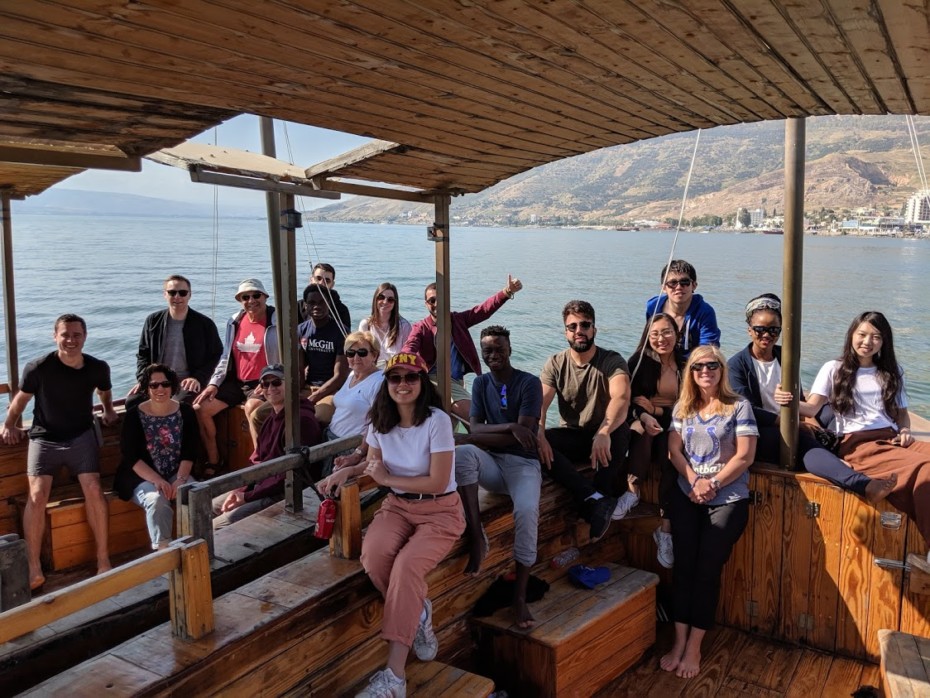
Experience, as the saying goes, is the best teacher. All the more so when the experience is lived first-hand. It was this notion that was very much at the heart of a recent transformational learning exchange that concluded this past May in the Faculty of Engineering.
Disguised by the unassuming title “FACC 501 ‘Building a Winning Business Plan,’” this course is a requisite in the Faculty of Engineering Minor in Technological Entrepreneurship. It is also open to students across the University. Its main goal is for the students to develop a concept or opportunity into a comprehensive business plan and then pitch it to a panel of potential investors at the end of the course.
However, thanks to a generous gift from the Gerald Schwartz – Heather Reisman Foundation, the course took on a dramatic new dimension in 2019: it provided a chance for McGill students to travel to Israel and experience directly why Israel is known for being ‘Start-up Nation.’
Innovative economy
Despite its small population of only 7 million inhabitants, Israel is the world’s most innovative economy. Numerous facts attest to Israel’s proficiency in innovation, including:
- No.1 in the world for Nasdaq-listed companies except the U.S. and China
- No.1 in Venture Capital investment as a percentage of GDP
- No.1 in start-ups concentration: 1 for every 400 people
- No.1 in concentration of R&D employees: 140 per 10,000 (the U.S. is second with 85 per 10,000)
How such a tiny nation is able to lead the world in innovation is something that must be seen first-hand to be understood. Bringing this to life was one of the key goals of the exchange. And, as an exchange, the program also brought Israeli students to Canada to likewise enhance their understanding of the Canadian way of doing things.
Of course, the trip to Israel accomplished more than provide insight into the innovative economy – it was also a tremendous opportunity to learn about the rich culture and history of this storied place, which occupies a special part of the world’s collective heritage. The students visited the Negev desert, the Dead Sea, Haifa, and even took a boat ride on the Sea of Galilee in a wooden barge. They visited holy sites in Jerusalem, Nazareth and Bethlehem, and other points in between. For many, it was the trip of a lifetime.
“This was easily the highlight of my undergraduate program at McGill,” said Valary Akinyi (BEng ’19). “This experience impacted, and will continue to impact, my life in many positive ways.”
Meeting with executives
In all nineteen students took part in the program, with thirteen McGillians travelling to Israel on May 1, for a two-week stay, while six students from Israel’s Ben Gurion University (BGU) came to Montreal on April 18 for a similar period. These 19 students worked in diverse teams during the winter semester to build business plans around four innovative technologies from the commercialization offices of McGill and Ben-Gurion Universities. Then, during the exchange visits, the teams pitched their business cases to Venture Capitalists in both Montreal and Israel.
On the subject of innovation and entrepreneurship, the students were given a chance to meet with executives from Jerusalem Venture Partners (JVP), a Venture Capital firm that is an emblem of Israel’s start-up nation ethos. With over $1.4 billion in funds raised, and a dozen companies listed on the NASDAQ, it is one of the pre-eminent start-up investors in this intensely competitive market.
The Israeli students who journeyed to Canada were likewise given a grand tour with visits to key sites across Montreal, as well as day trips to Ottawa and Quebec City. And like their Canadian counterparts, they were also introduced to the local start-up culture, thanks to a session at McGill’s own Dobson Centre for Entrepreneurship.
Alumni participation
McGill alumni were also key contributors to the success of the program. Mark Levine (BEng ’91) took part by acting as a mentor to one of the student teams. For him as well, the experience left an impression: “I am extremely honoured and proud to have been part of the inaugural cooperative between BGU and McGill,” he said. “The program shows how the experiences and cultures of diverse groups not only result in exceptional work, but also provide meaningful growth far beyond the classroom.”
The person behind this immersive experience was Dr. Michael Avedesian, himself a highly experienced entrepreneur who has launched several successful companies. A professor of practice at both the Desautels School of Management and the Faculty of Engineering, he has been an instructor and Entrepreneur-in-Residence since 2003. His own first-hand experience as a company founder is an invaluable asset to the students in the program. Dr. Avedesian’s counterpart at BGU was Yuval Bitan, a senior lecturer in Industrial Engineering and Management. Professor Bitan coordinated the McGill course on behalf of BGU.
The FACC 501 experience is by no means a one-time opportunity, however, as the course will continue to offer its Israel exchange experience for the next three years, thanks to the continued support of the Schwartz-Reisman Foundation. Students interested in expanding their entrepreneurial horizons should register for the course, or contact Dr. Avedesian to find out more at michael.avedesian@mcgill.ca
